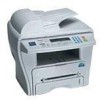Ricoh FX16 Operating Instructions - Page 139
Paper Specifications, Overview, Supported Sizes of Paper
 |
View all Ricoh FX16 manuals
Add to My Manuals
Save this manual to your list of manuals |
Page 139 highlights
Paper Specifications Overview Your machine accepts a variety of print materials, such as cut-sheet paper (including up to 100% recycled fiber content paper), envelopes, labels, transparencies and custom-size paper. Properties, such as weight, composition, grain and moisture content, are important factors affecting the machine's performance and the output quality. Paper that does not meet the guidelines outlined in this Reference can cause the following problems: • Poor print quality • Increased paper jams • Premature wear on the machine. NOTES: • Some paper may meet all of the guidelines in this guide and still not produce satisfactory results. This may be the result of improper handling, unacceptable temperature and humidity levels, or other variables over which the manufacturer has no control. • Before purchasing large quantities of paper, insure the paper meets the requirements specified in this Operating Instructions. CAUTION: Using paper that does not meet these specifications may cause problems, requiring repairs. These repairs are not covered by the manufacturer's warranty or service agreements. Supported Sizes of Paper Paper Letter A4 Executive Legal B5 Folio A5 A.6 SPECIFICATIONS Dimensions* 8.5 X 11 in. (216 X 279 mm) 210 X 297 mm (8.3 X 11.7 in.) 7.25 X 10.5 in. (191 X 267 mm) 8.5 X 14 in. (216 X 356 mm) 7.2 X 10 in. (182 X 257 mm) 216 X 330 mm (8.5 X 13 in.) 148 X 210 mm (5.83 X 8.27 in.) Weight Capacity** • 60 to 90 g/m2 bond (16 to 24 lb) for the paper tray • 60 to 163 g/m2 bond (16 to 43 lb) for the Bypass tray • 250 sheets of 75 g/m2 bond (20 lb) paper for the paper tray • 1 sheet of paper for the Bypass tray















